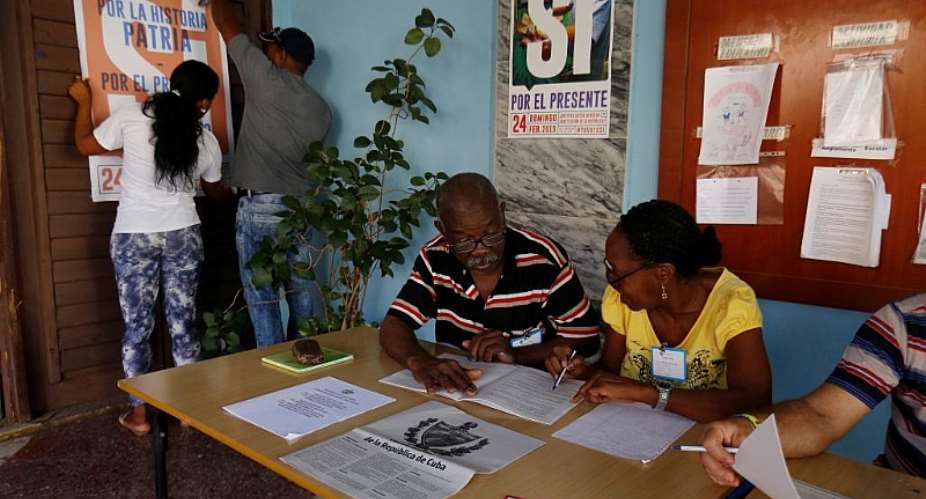More than eight million Cubans were expected to vote Sunday on a new constitution, widely seen as a referendum on socialism itself. Officials have called on the people to show their patriotism by voting “yes”, as the crisis in Venezuela has cast doubt on the viability of the socialist model.
The new constitution updates the original 1976 charter enacted under Cuba's former president and leader of the Communist revolution, Fidel Castro.
Current leader Miguel Diaz-Canel argues that its aim is to "guarantee and preserve the rights of each citizen, and enhance the dignity of our people," he wrote on his Twitter account, which has more than 99 thousand followers.
"Because it is anti-imperialist," he added.
The Cuba vote has been overshadowed by the crisis in neighbouring Venezuela, which witnessed deadly border clashes on Saturday following a high-risk operation to bring humanitarian aid to millions.
Diaz-Canel has been quick to defend President Nicolas Maduro against what he describes "US aggression."
"Hands off Venezuela, enough false pretexts to cover sinister plans,'" he warned Saturday, saying humanitarian aid to Caracas was a prelude to military intervention.
Discredited ideology
Yet the scale of the disaster Maduro has brought upon Venezuela in the past five years, with GDP falling by half, has cast doubt on the future of socialism, so much so that US President Donald Trump has claimed it "is dying".
Cuban officials though have exhorted the population to vote 'yes' and resist the threat of "American imperialism".
The new charter recognises a limited role for the free market and private investment but maintains the central role of socialism and communism as the only way forward.
If passed, Cuba's updated constitution would protect private property, reintroduce the role of prime minister and, for the first time, limit the Cuban presidency to two consecutive five-year terms.
Unlike in previous votes, when regime critics tended to boycott or spoil ballots, this time opponents of the Communist Party – which has ruled since 1959 – are calling on people to vote 'no' under the hashtag #YoVotoNo (#IVoteNo) on the limited social media networks available on the island.
Voicing dissent
"The new text doesn't change anything," opposition leader Hildebrando Chaviano, told RFI's French service.
"There is going to be a high abstention rate and many people will vote 'no'", he says. "What is missing, is a real democratic constitution which neither prevents economic development nor political and social development."
Criticised by the Catholic Church for its one-party ideology centred on socialism, the updated constitution has been rejected by a majority of Cubans online – unusual in a country where dissent has long been considered treasonous.
However, the official line remains that voters should approve the new charter even if they don't agree with everything in it.
The 1976 Constitution won 97.7 percent backing, but the 'no' campaign could result in a significantly smaller approval rating, even if there is almost no chance of the updated charter being rejected.





 Dumsor: Mathew Opoku Prempeh has been disrespectful, he should be fired – IES
Dumsor: Mathew Opoku Prempeh has been disrespectful, he should be fired – IES
 NPP prioritizing politics over power crisis solution — PR Strategist
NPP prioritizing politics over power crisis solution — PR Strategist
 E/R: Gory accidents kills 3 persons at Aseseaso, several others critically injur...
E/R: Gory accidents kills 3 persons at Aseseaso, several others critically injur...
 Nobody can come up with 'dumsor' timetable except Energy Minister – Osafo-Maafo
Nobody can come up with 'dumsor' timetable except Energy Minister – Osafo-Maafo
 Dumsor: You ‘the men’ find it difficult to draw timetable when ‘incompetent’ NDC...
Dumsor: You ‘the men’ find it difficult to draw timetable when ‘incompetent’ NDC...
 We’re working to restore supply after heavy rains caused outages in parts of Gre...
We’re working to restore supply after heavy rains caused outages in parts of Gre...
 NPP government plans to expand rail network to every region — Peter Amewu
NPP government plans to expand rail network to every region — Peter Amewu
 Dumsor must stop vigil part 2: We’ll choose how we demonstrate and who to partne...
Dumsor must stop vigil part 2: We’ll choose how we demonstrate and who to partne...
 2024 elections: NDC stands on the side of morality, truth; NPP isn't an option —...
2024 elections: NDC stands on the side of morality, truth; NPP isn't an option —...
 Akufo-Addo has moved Ghana from 'Beyond Aid' to ‘Beyond Borrowing’ — Haruna Idri...
Akufo-Addo has moved Ghana from 'Beyond Aid' to ‘Beyond Borrowing’ — Haruna Idri...
